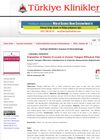 6 citations,
February 2022 in “Journal of immunology research”
6 citations,
February 2022 in “Journal of immunology research” Exosomes from fat-derived stem cells can potentially improve hair growth and could be a new treatment for immune-related hair loss.
 2 citations,
May 2021 in “Stem Cells International”
2 citations,
May 2021 in “Stem Cells International” Human pluripotent stem cells could be used to make platelets for medical use, but safety, effectiveness, and cost issues need to be resolved.
May 2022 in “Current Enzyme Inhibition” Compound 7b is a promising candidate for treating benign prostatic hyperplasia and prostate cancer.
[object Object]  January 2022 in “Skin appendage disorders”
January 2022 in “Skin appendage disorders” Finasteride is effective for male hair loss, but it may cause fertility issues, mental health problems, and rarely, breast growth. Regular health checks can reduce the risk of prostate cancer. Patient understanding and involvement in treatment is important.
146 citations,
September 2013 in “Advances in nutrition” Bariatric surgery can cause serious mineral deficiencies, requiring better patient education and monitoring.
20 citations,
November 2021 in “Frontiers in cell and developmental biology” Skin organoids from stem cells could better mimic real skin but face challenges.
 10 citations,
September 2022 in “Advanced Healthcare Materials”
10 citations,
September 2022 in “Advanced Healthcare Materials” Current methods can't fully recreate skin and its features, and more research is needed for clinical use.
10 citations,
January 2011 in “Journal of biomedical optics” OCT is a reliable, noninvasive way to measure hair thickness.
January 2024 in “Medicina” Statins may help treat PCOS by lowering androgen levels and improving cholesterol.
 August 2023 in “Scientia Pharmaceutica”
August 2023 in “Scientia Pharmaceutica” Color changes in Minoxidil hair products do not affect their effectiveness.
 April 2023 in “Nigerian Journal of Clinical Practice”
April 2023 in “Nigerian Journal of Clinical Practice” Hair loss in adults is linked to heart disease risk factors like unhealthy blood fats, lack of exercise, and alcohol use. It's also slightly more common in people with metabolic syndrome. As people age, hair loss gets worse. In men, severe hair loss is tied to high blood pressure and a larger waist. In women, it's tied to higher body weight. People with hair loss should be checked for unhealthy blood fats and advised to avoid alcohol and inactivity.
[object Object]  August 2022 in “IntechOpen eBooks”
August 2022 in “IntechOpen eBooks” Congenital Adrenal Hyperplasia is a rare inherited disease causing hormone imbalances, affecting growth, fertility, and heart health, diagnosed through blood tests and treated with medication and lifestyle changes.
258 citations,
July 2005 in “Journal of lipid research” DGAT1 enzyme helps make diacylglycerols, waxes, and retinyl esters.
 205 citations,
September 2018 in “Nutrients”
205 citations,
September 2018 in “Nutrients” Essential oils from Curcuma species, like turmeric, have compounds that can fight inflammation, cancer, and bacteria, and can also stimulate hair regrowth in bald males.
91 citations,
November 2008 in “Journal of biological chemistry/The Journal of biological chemistry” DGAT1 enzyme is crucial for healthy skin and hair by regulating retinoid levels.
56 citations,
September 2010 in “Veterinary pathology” Certain mouse strains develop a skin condition similar to a human hair loss disease due to genetic defects.
54 citations,
June 2018 in “Nutrients” Early diagnosis and a strict gluten-free diet are crucial for children with celiac disease to improve symptoms.
 37 citations,
October 2021 in “Nutrients”
37 citations,
October 2021 in “Nutrients” Vitamin D might help regulate insulin in the body, but taking Vitamin D supplements doesn't clearly prevent or improve type 2 diabetes. More research is needed.
 30 citations,
January 2023 in “EFSA journal”
30 citations,
January 2023 in “EFSA journal” Adults should not consume more than 255 micrograms of selenium per day to avoid risk of hair loss and other side effects.
16 citations,
January 2022 in “International journal of molecular sciences” Certain daily habits like stress, diet, and sleep can affect the severity of hair loss in alopecia areata.
 10 citations,
September 2021 in “International Journal of Nanomedicine”
10 citations,
September 2021 in “International Journal of Nanomedicine” Tiny particles called extracellular vesicles show promise for treating skin conditions and promoting hair growth.
 7 citations,
December 2022 in “Frontiers in Bioengineering and Biotechnology”
7 citations,
December 2022 in “Frontiers in Bioengineering and Biotechnology” Extracellular vesicles show promise for wound healing, but more research is needed to improve their stability and production.
4 citations,
May 2023 in “Cells” Baricitinib and its combination with lonafarnib improve fat cell formation in certain genetic disorders.
4 citations,
November 2018 in “Journal of comparative pathology” The three adipokines—leptin, adiponectin, and resistin—are present in various cells of normal dog skin.
3 citations,
December 2023 in “Biomedicines” PRP therapy helps skin heal and improve by promoting cell growth and repair.
 3 citations,
March 2023 in “Life”
3 citations,
March 2023 in “Life” Obesity can worsen wound healing by negatively affecting the function of stem cells in fat tissue.
 3 citations,
January 2022 in “Scientific Reports”
3 citations,
January 2022 in “Scientific Reports” A new treatment called SAMiRNA-AR68 increases hair count in people with hair loss, showing similar results to existing treatments but without side effects.
2 citations,
October 2023 in “Biology” Cobalt is important for health but too much or too little can cause health problems, and its environmental buildup is a concern.
 1 citations,
January 2023 in “Metabolites”
1 citations,
January 2023 in “Metabolites” Changes in gut bacteria can contribute to the development of Polycystic Ovary Syndrome (PCOS), affecting metabolism, immunity, and causing inflammation. Treatments may involve adjusting these factors.
 1 citations,
January 2018 in “Turkiye Klinikleri Journal of Dermatology”
1 citations,
January 2018 in “Turkiye Klinikleri Journal of Dermatology” Vitamin D levels are not correlated with chronic hair loss in Telogen Effluvium patients.















